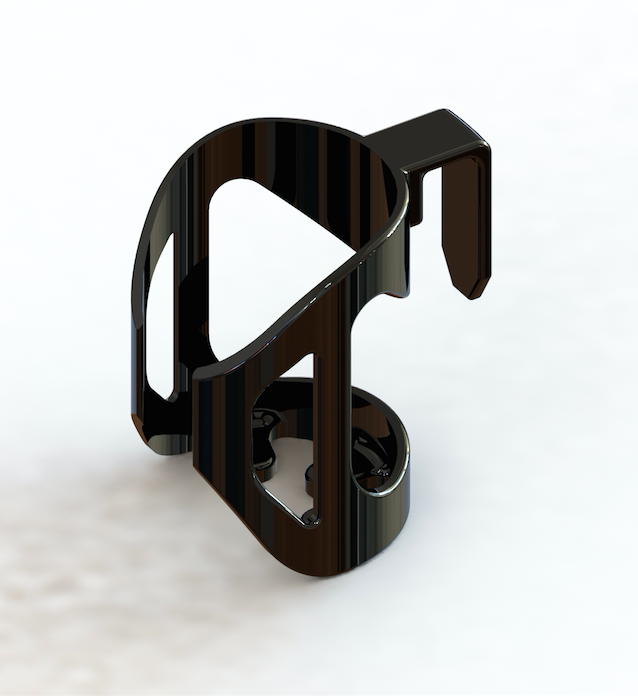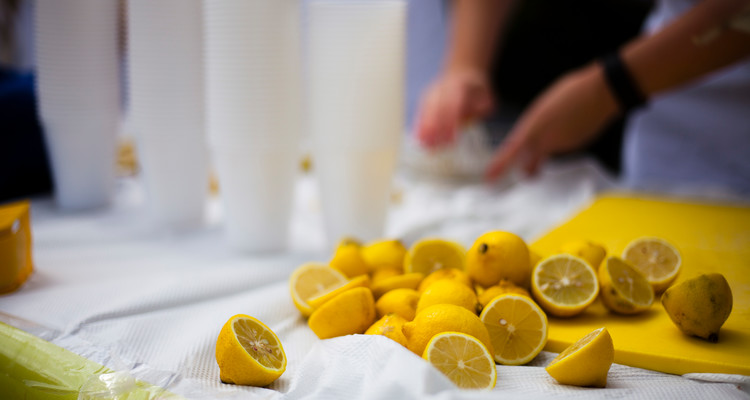On a snowy day in December, several businesses lined Dorsey Way in the Anderson Student Center. As students milled by, the business owners tried to catch students' attention and prove their products were useful and valuable.
These business owners were unique: they were also students, there not only to show off a semester's worth of work but to test its viability. The Foundations of Entrepreneurship class (or so-called "Lemonade Stand Class") tasks students with envisioning and launching a business. The goal is to develop confidence in one's ability to do so, and to begin to grow and hone entrepreneurial skills.
"A lot of people claim they are too young and don't have enough experience, but they can do it," said Alec Johnson, one of the Opus College of Business professors who teaches Entrepreneurship 200. "Part of the criticism will come from people who haven't done it. But what they don't understand is that entrepreneurship is not a one-off event. It is a process.
"We give them their first thing. The first real experience – for most of them – i.e., the lemonade stand," Johnson said.
The Lemonade Stand Class has served as the incubator for Love Your Melon and to hone Unique Pontoons.
While creating a sustainable business is a possible perk of the class, Johnson and Associate Professor of Entrepreneurship Jay Ebben are really looking for students to learn business practices by experimenting and adapting to arising issues.
"Part of them gaining confidence is letting them figure it out for themselves as much as they can," Ebben said.
"Confidence includes making mistakes and being challenged on their judgment," Johnson said.
"And realizing, in the end, they can figure it out," Ebben said.
While students are learning self-reliance, they are also provided with a supportive environment: They receive some coaching from the professors as well as collaboration with other students.
"They want to network and collaborate and be mentored by other people in the same boat," Ebben said.
Students check in and reflect regularly with Ebben and Johnson, and, at semester's end, pitch their business to an alumni panel.
Here are two projects produced this semester.
VersAttach: the universal water bottle holder
 Junior Jacob Mischke and Amari Ziton teamed up with engineering students on campus to create a universal water bottle holder that can fit on beds in residence halls.
Junior Jacob Mischke and Amari Ziton teamed up with engineering students on campus to create a universal water bottle holder that can fit on beds in residence halls.
Mischke connected with junior Kyle Schneider and embarked on a 3-D printing adventure. To keep costs down, they used the university's 3-D printers in the create[space] in the Anderson Student Center. Both said figuring out the production side of the business was a challenge, particularly for Mischke, who learned just how much time, energy and money can go into that side of creating a business.
While a business with more money could have paid several thousand dollars to create a mold for their holder to then be mass produced, they had to first create a prototype and then had a labor-intensive process for creating each unit.
"I didn't envision it being as difficult as it was," Mischke said. "But I didn't envision the end product to be good, either."
The business took one of the top three slots from the alumni pitch panel at the end of the semester. Mischke said they are going to attempt and continue the business outside of the class.
"This is real-world stuff," Mischke said. "It was good experience, and I can say that it has humbled me in regard to starting a business. There are a lot of pitfalls, and it's about overcoming those and learning from it. You have to adapt."
The ColLedge
 Juniors Mitch Roers and Saif Ahmed and first-year Mackenna Cristilly also set out to solve a space problem: They created a ledge that is anchored underneath the mattress to create an easy and convenient nightstand without taking up valuable residence hall room space.
Juniors Mitch Roers and Saif Ahmed and first-year Mackenna Cristilly also set out to solve a space problem: They created a ledge that is anchored underneath the mattress to create an easy and convenient nightstand without taking up valuable residence hall room space.
With the task of creating a physical product, Ebben connected them with Garrett Faust '13, one of the owners of Uptown Woodworks. Faust said he mentored the team because his own undergraduate experience at St. Thomas was so positive and he wanted to give back to the community.
"I think this experience just reinforced how important it is to develop mentor-mentee relationships in our communities, especially in the context of college," Faust said. "It makes a world of difference for students if you have somewhere they can turn for help to develop their ideas and dreams. I think St. Thomas does a great job at developing these resources and it continues to improve as time goes on."
"Meeting with him gave us this wisdom of, 'That doesn't really work, or yes that does work,'" Cristilly said, and Roers added that it was also a valuable networking opportunity in the Tommie network.
The team worked through several prototypes and feedback from the class until their product emerged.
"It's trial and error the whole semester," Cristilly said. "You figure out the steps, with guidance obviously, but you figure out the steps in a way that I think is really beneficial."
They were also excited to have the hands-on experience of pitching their product to alumni, saying they were glad to show off their hard work from the semester.
From the class, Roers said he learned not to be afraid of the risk that can come with starting a business.
"A lot of people have ideas that they think will be cool, but if you don't act, someone else is going to do it or the time will pass you by," Roers said.
"There's never a right time," Ahmed added."You just have to jump in and do it."







